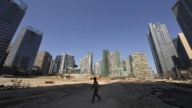【新唐人2013年10月05日讯】据英国《路透社》报导说,中共中央政府从2010年开始,启动一个全国性数字化房地产数据库,它将使得用户可以查询一个人拥有多少房地产以及有关房屋的细节。但是这个计划遭到地方政府的反对。大陆学者分析,数据库的建立,是中共迫于民意,反腐保党的需要,以及解决房市泡沫日趋严重的手段,而地方政府既不希望中央干预它的土地财政,官员也惧怕因此财产被曝光。
《路透社》10月2号的报导引述行业专家的分析说,数据库不仅被当局视为控制房市泡沫,而且是迫使腐败地方官员交代使用非法所得购买房产的关键。
湖北作家阮云华:“数据库一旦建立,官员的财产就必然公开化。这是从数据的角度逼迫他们公开财产。他们当然不会上这个当,所以他们拒绝配合这个政策。他们这样做就可以欲盖弥彰,始终让老百姓不知道他们的财产。”
行业专家说,位于计划书之列的40个大城市拒绝签署,直到住建部同意他们披露的信息不会公开之后。数据库计划的第二阶段,本来应该在六月份完成并且包括500个更多城市,但还没有获得结果。
房地产数据,尽管有利于房地产市场,但是对试图隐藏多处豪宅的官员来说构成威胁。
在最近几个月,作为公务员不可能购买得起多套房产,而被曝光出来的大陆地方官员不在少数。著名的有“房叔”和“房姐”。他们已经成为公众愤怒的目标。
在一个特别高调的案件当中,广州市一名城市管理官员蔡彬,拥有超过20栋房屋,去年十月被撤职。政府发给他的薪水一个月仅仅1万元。
即使建立了数据库,数据的真实性也需要打一个问号。湖北作家阮云华说,特别是一些高官,他可以有几个身份证,所以房产最后的登记入库信息也未必是真实的。
阮云华:“政府提出要建立数据库应该是为了迎合民心,但是它提出来最后没建立,或者建立的进度始终缓慢,就像政府每天都在反腐,每天都要官员公布财产,但是这个制度始终没建立,始终拖着,一方面又缓和了民众的迫切心理,一方面又达到自己的目的,不断拖延时间,为最终洗白财产赢得时间。”
河南许昌市房地产投资顾问郑志遥认为,地方政府对数据库的抗拒主要是因为不愿意中央干预它的土地财政,担忧中央打压房地产泡沫损害地方经济发展。
郑志遥:“哪个地方政府也不愿意自己政府的房地产崩盘,也不愿意自己这个地方辛辛苦苦搞的楼盘,那么多再建项目变成烂尾工程变成鬼城,对地方政府的压力很大,造成地方银行的坏账,因为房地产不是一个行业,后面还有土地,还有建材,就业,税收,这都和政府的财政税收紧密相连的。”
郑志遥透露,地方官员和房地产商为了中饱私囊,采用虚假手段推高房地产泡沫。
郑志遥:“地产商房子盖完了之后,并不是卖给客户了。一部分是卖了、一部分是抵押给银行了、还有一部分是房地产商自己内部员工变相购买,然后等卖一部分,再把这一部分虚假的购房,他们购完之后,拿这个去抵押贷款。其实就是房地产商自己买自己的房子,然后抵押给银行再去贷款,然后进行下一个楼盘的运作。”
郑志遥说,房地产的不健康,房地产的泡沫化,指的就是这一部分,它完全是资金在空转,产生的泡沫就是把房价推高,把风险转嫁给银行和市场。
中国仅有的房屋普查是在1986年完成,它在2010年搞的经济普查没有包括房屋调查。今年的经济普查也不会包括。许多城市也缺乏历史性置业数据。
采访编辑/秦雪 后制/孙寕
Local Governments Against Central Real Estate Database
British Reuters reported that in 2010, the CCP Central
government planned to start a nationwide real estate database
which would allow users to check how much real estate
a person owns and other housing details.
But the plan met with opposition from local governments.
Mainland scholars analyze that the database creation is more
out of a sense of forced obligation due to
he anti-corruption campaigns.
It’s also a solution for the increasingly serious
housing bubble.
But, the local government doesn’t want the central
government to intervene in local land finance.
Officials have concerns that their property
will also be exposed.
October 2, Reuters, quoting expert analysis, reported that
the database is not the only way to control the housing
bubble, but it is the key to force the local corrupt officials
to confess how they buy property using illicit income.
Hubei writer Ruan Yunhua: “The officials’ assets have
to be public once the database is established.
It’s the way to force them to make assets public
from a data perspective.
They wouldn’t be fooled and refuse to cooperate
with this policy.
They intended to hide their assets from citizens,
but it is in vain."
Domain experts said officials from 40 cities were listed
in the proposal as refusing to sign
until the Housing Department agreed not
to publicize their information.
The second phase of the Database plan should be completed
in June which includes 500 more cities;
but there are no results so far.
Real estate data is favorable to the real estate market,
but a threat to the officials who try to hide several houses.
In recent months, many Mainland officials have been
exposed.
They won’t be able to afford several pieces of real estate
as civil servants.
The famous “room uncle" and “room sister” have become
the target of public anger.
In one particularly high-profile case, a Guangzhou city
Administrator, Cai Bin, was dismissed in October
due to owning more than 20 houses.
His monthly salary is only 10 thousand RMB.
Data authenticity is questioned even though the database
has been established.
Ruan Yunhua said some senior officials can have several
identity cards, so the final registration
of real estate information is not necessarily factual.
Ruan Yunhua: “The database establishment proposal
by the Government is to cater to people.
But the proposal hasn’t been done or the progression is as slow,
as the government’s anti-corruption every day or public official’s
assets every day.
The unconstructed system cannot ease the people’s urgent
psychological attention, but only gains more time
for themselves to make it legal."
Xuchang real estate investment adviser Zheng Zhiyao
thinks that the local government’s resistance to the database
establishment is mainly because it is reluctant to let
the central government intervene in the local land finance.
They have concerns that the central government bursting
the realestate bubble will impact local economic development.
Xuchang City real estate investment adviser Zheng Zhiyao:
“No local governments want to see their real estate crash,
suspended construction projects, or even a ghost town.
It will result in more pressure on the local government
and bad debts to local banks.
Because real estate is not isolated, it has land, building
materials, employment, taxation behind which are related
to government finance and tax income."
Zheng Zhiyao revealed that local officials and real estate
developers use fraudulent means to increase
the real estate bubble to line their own pockets.
Zheng Zhiyao: “The finished houses are not all sold
to the customers.
One part is sold to customers; another part is mortgaged
to the bank; the internal staff will buy the rest disguised
as false buyers.
It actually means the real estate companies buy their own
house, mortgage to the bank, go to the loans,
and then proceed to the next real estate operation."
Zheng Zhiyao said that unhealthy real estate and the real
estate bubble refer to this part—complete idle funds.
The resulting foam is to increase house prices and pass
the risk to the banks and markets.
The China housing census of 1986 is the only
completed census.
The economic census in 2010 did not include
the housing census.
This year’s economic census will not include
the housing census either.
Many cities also lack historic housing census data.



























